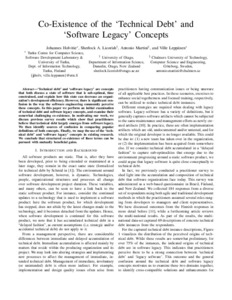Co-existence of the Technical Debt and Software Legacy Concepts
Johannes Holvitie; Sherlock Licorish; Antonio Martini; Ville Leppänen
Co-existence of the Technical Debt and Software Legacy Concepts
Johannes Holvitie
Sherlock Licorish
Antonio Martini
Ville Leppänen
Julkaisun pysyvä osoite on:
https://urn.fi/URN:NBN:fi-fe2021042716327
https://urn.fi/URN:NBN:fi-fe2021042716327
Tiivistelmä
‘Technical debt’ and ‘software legacy’ are concepts that both discuss a state of software that is sub-optimal, time constrained, and explain how this state can decrease an organization’s development efficiency. However, there is significant confusion in the way the software engineering community perceive these concepts. In this paper we perform an initial examination of technical debt and software legacy concepts, and examine their somewhat challenging co-existence. In motivating our work, we discuss previous survey results which show that practitioners believe that technical debt largely emerges from software legacy. We then identify sources of confusion in comparing popular definitions of both concepts. Finally, we map the use of the ‘technical debt’ and ‘software legacy’ concepts in existing research. We conclude that structured co-existence of these terms can be pursued with mutually beneficial gains.
Kokoelmat
- Rinnakkaistallenteet [29337]
